History
Kingston Lodge No. 1010 – a brief history
During a time of financial difficulties in 1828, two Lodges in Kingston-Upon-Hull, the Phoenix and Minerva planned to amalgamate under the name Kingston. The scheme came to naught in the shadow of an unfortunate incident that had befallen the Minerva Lodge, when seventeen of its members defected to the Humber Lodge in 1827 and nearly caused Minerva to fall.
Minerva’s fortunes were soon rejuvenated, however, and by 1864 Freemasonry was flourishing. There were in excess of 200 members on Humber’s roll and over 130 on Minerva’s. The older members within Minerva were very hesitant when a proposal to create a new Lodge was made. Misgivings abounded as it was feared that all would go awry again. Plans for the new Lodge, to be called the Kingston Lodge went ahead nevertheless, mainly due to the help of the Humber Lodge, along with a few brave souls from Minerva as they felt that there was necessity for an additional Lodge, to ease the overcrowding in the existing two.
The new Lodge, the ‘Kingston Lodge’ was formed in 1864. The first members were mainly merchants and civil engineers, although Simeon Mosely, a Past Master of the Minerva Lodge was a Surgeon-Dentist and he became its founding Worshipful Master. He was a man of strong persuasion and deep humanity. His acts of philanthropy would earn him the title of ‘Father to the Poor’.
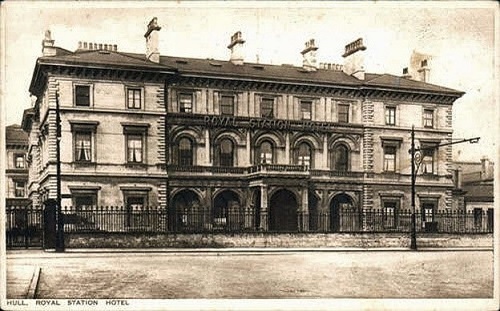 G.T. Andrews, architect to the ‘Railway King’ George Hudson, had designed a new station in Hull, named after the nearby Paragon Street. Rivalling Derby and York, with a three-span roof covering over two acres. It had an adjoining hotel, in which Queen Victoria and Prince Albert had stayed during their visit. The Royal Station Hotel was a palatial building and considered the finest in the north of England and it was here that Kingston Lodge was consecrated on August 5th, 1864, by the Deputy Provincial Grand Master G. Marwood. Amid the pomp and circumstance the first new member was initiated. He was George C. Roberts who was soon to become Mayor of Hull.
G.T. Andrews, architect to the ‘Railway King’ George Hudson, had designed a new station in Hull, named after the nearby Paragon Street. Rivalling Derby and York, with a three-span roof covering over two acres. It had an adjoining hotel, in which Queen Victoria and Prince Albert had stayed during their visit. The Royal Station Hotel was a palatial building and considered the finest in the north of England and it was here that Kingston Lodge was consecrated on August 5th, 1864, by the Deputy Provincial Grand Master G. Marwood. Amid the pomp and circumstance the first new member was initiated. He was George C. Roberts who was soon to become Mayor of Hull.
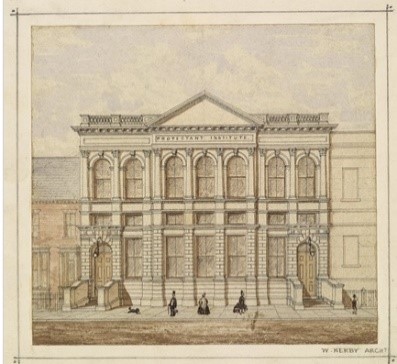 Simeon Mosely had frequently used the hotel to provide elegant dinners during his two-year office as Master of the Minerva Lodge, however other members of the fledgling Kingston Lodge pressed for a more suitable venue. Enquiries led in December 1866 to rooms being rented on the first floor of the Protestant Hall, Kingston Square, adjoining the Public Rooms (now Hull New Theatre).
Simeon Mosely had frequently used the hotel to provide elegant dinners during his two-year office as Master of the Minerva Lodge, however other members of the fledgling Kingston Lodge pressed for a more suitable venue. Enquiries led in December 1866 to rooms being rented on the first floor of the Protestant Hall, Kingston Square, adjoining the Public Rooms (now Hull New Theatre).
Conditions within the building proved problematic, damp being the main concern, coupled with noise and disruption from the Harmonic Society who practised in one of the other rooms! The Lodge remained there until April 1870 when it moved around the corner into Sculcoates Hall in Worship Street.
Sculcoates Hall housed a Police station and was used by the Town Board of Health, but four rooms on the first floor were available to lease. Kingston Lodge were permitted to remove a wall between two of the smaller rooms to provide a banqueting room, and to install gas lighting.
In 1885 the Town’s Watch Committee proposed that as firefighting was then one of the functions of the Police, a new police fire station was to be built on the site. This became Hull Central Fire Station. Kingston Lodge was given notice to vacate the premises.
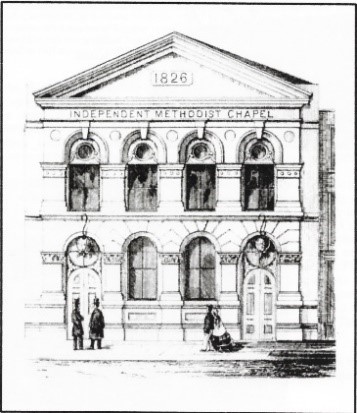 Fortuitously, a change of landlord of the Protestant Hall had occurred. Lt. Col. Gleadow, the new owner of the Hall and a Director of Hull Brewery approached Kingston Lodge about his plans to refurbish the building as a new Masonic Hall. No doubt he was aware of the impending eviction and saw a good business opportunity! As a consequence, Kingston and De La Pole Lodges undertook joint tenancy. However, disaster struck on Christmas Day 1891, when a fire virtually destroyed the Public Rooms next door. The fire caused sufficient damage to the Lodge rooms as to necessitate a temporary move to Minerva Lodge at Dagger Lane. Then, after nineteen years of tenancy, Gleadow intimated whilst negotiating the terms of a new lease that he might sell the property.
Fortuitously, a change of landlord of the Protestant Hall had occurred. Lt. Col. Gleadow, the new owner of the Hall and a Director of Hull Brewery approached Kingston Lodge about his plans to refurbish the building as a new Masonic Hall. No doubt he was aware of the impending eviction and saw a good business opportunity! As a consequence, Kingston and De La Pole Lodges undertook joint tenancy. However, disaster struck on Christmas Day 1891, when a fire virtually destroyed the Public Rooms next door. The fire caused sufficient damage to the Lodge rooms as to necessitate a temporary move to Minerva Lodge at Dagger Lane. Then, after nineteen years of tenancy, Gleadow intimated whilst negotiating the terms of a new lease that he might sell the property.
De La Pole Lodge left in 1904, purchasing their own property in Osborne Street. Kingston joined them as their tenant.The Masonic Hall in Osborne street was originally a Baptist meeting place and had an elaborate Italian façade. The Chapel trustees sold the building to De La Pole Lodge, with Kingston Lodge joining them in 1905. Lord Bolton Lodge joining in 1908 and Wilberforce Lodge in 1915.
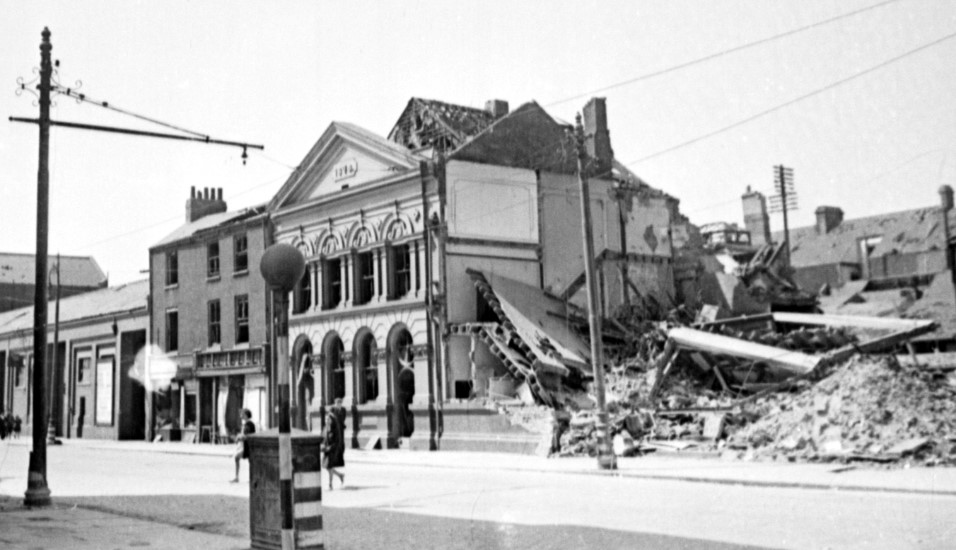 The two adjacent properties were subsequently purchased, and structural alterations began in 1921-3, including the building of a caretaker’s house. Meetings were held during this period at Humber Lodge’s premises, which were then, on the corner of Anne Street and Osborne Street.
The two adjacent properties were subsequently purchased, and structural alterations began in 1921-3, including the building of a caretaker’s house. Meetings were held during this period at Humber Lodge’s premises, which were then, on the corner of Anne Street and Osborne Street.
At midnight on the 7th May 1941, 120 enemy aircraft dropped over 150 tons of high explosive bombs and thousands of incendiaries on the City of Hull. The Osborne Street Masonic Hall was totally destroyed, as was Humber Lodge’s premises. Park street Masonic Hall was also reduced as unfit for use. So, the Minerva Lodge generously offered the use of their Hall in Dagger Lane to all of the Lodges rendered homeless for the duration of the War.
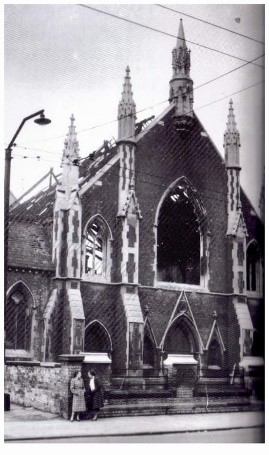 The Wesleyan Chapel and Sunday school rooms on Beverley Road had become vacant during the war. It was swiftly procured as a suitable building for a new Masonic Hall in 1946. Due to post-war building restrictions, it was decided to utilise the school rooms first, with a view to converting the Chapel building later. To raise extra income, the Chapel was rented out to a local printer, unfortunately a fire broke out in the early hours of 9th Feb 1954 reducing the Chapel to an unstable shell, necessitating its demolition.
The Wesleyan Chapel and Sunday school rooms on Beverley Road had become vacant during the war. It was swiftly procured as a suitable building for a new Masonic Hall in 1946. Due to post-war building restrictions, it was decided to utilise the school rooms first, with a view to converting the Chapel building later. To raise extra income, the Chapel was rented out to a local printer, unfortunately a fire broke out in the early hours of 9th Feb 1954 reducing the Chapel to an unstable shell, necessitating its demolition.
This resulted in an unexpected yet welcome carpark, a valuable asset in any City-centre nowadays.
Beverley Road Masonic Hall is still the home of Kingston Lodge today, along with other Lodges, Chapters and other Orders.
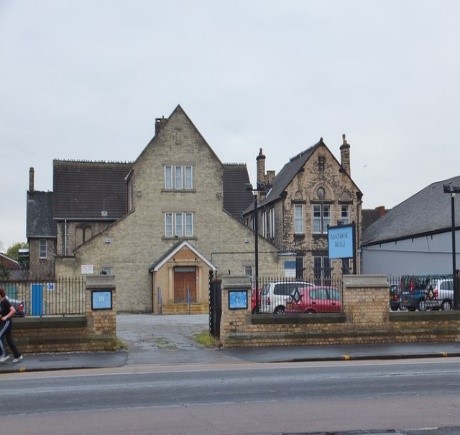
Neil Armstrong August 2023
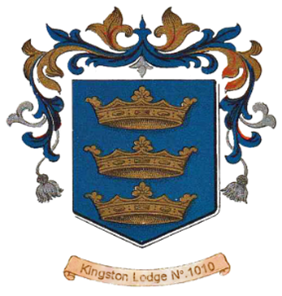
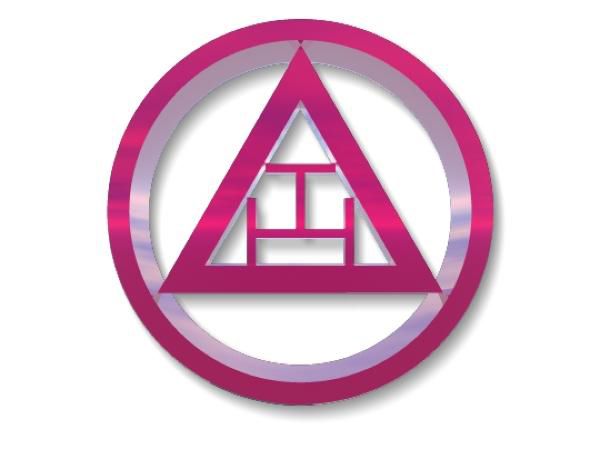
 G.T. Andrews, architect to the ‘Railway King’ George Hudson, had designed a new station in Hull, named after the nearby Paragon Street. Rivalling Derby and York, with a three-span roof covering over two acres. It had an adjoining hotel, in which Queen Victoria and Prince Albert had stayed during their visit.
G.T. Andrews, architect to the ‘Railway King’ George Hudson, had designed a new station in Hull, named after the nearby Paragon Street. Rivalling Derby and York, with a three-span roof covering over two acres. It had an adjoining hotel, in which Queen Victoria and Prince Albert had stayed during their visit.  Simeon Mosely had frequently used the hotel to provide elegant dinners during his two-year office as Master of the Minerva Lodge, however other members of the fledgling Kingston Lodge pressed for a more suitable venue. Enquiries led in December 1866 to rooms being rented on the first floor of the Protestant Hall, Kingston Square, adjoining the P
Simeon Mosely had frequently used the hotel to provide elegant dinners during his two-year office as Master of the Minerva Lodge, however other members of the fledgling Kingston Lodge pressed for a more suitable venue. Enquiries led in December 1866 to rooms being rented on the first floor of the Protestant Hall, Kingston Square, adjoining the P Fortuitously, a change of landlord of the Protestant Hall had occurred. Lt. Col. Gleadow, the new owner of the Hall and a Director of Hull Brewery approached Kingston Lodge about his plans to refurbish the building as a new Masonic Hall. No doubt he was aware of the impending eviction and saw a good business opportunity! As a consequence, Kingston and De La Pole Lodges undertook joint tenancy. However, disaster struck on Christmas Day 1891, when a fire virtually destroyed the Public Rooms next door. The fire caused sufficient damage to the Lodge rooms as to necessitate a temporary move to Minerva Lodge at Dagger Lane. Then, after nineteen years of tenancy, Gleadow intimated whilst negotiating the terms of a new lease that he might sell the property.
Fortuitously, a change of landlord of the Protestant Hall had occurred. Lt. Col. Gleadow, the new owner of the Hall and a Director of Hull Brewery approached Kingston Lodge about his plans to refurbish the building as a new Masonic Hall. No doubt he was aware of the impending eviction and saw a good business opportunity! As a consequence, Kingston and De La Pole Lodges undertook joint tenancy. However, disaster struck on Christmas Day 1891, when a fire virtually destroyed the Public Rooms next door. The fire caused sufficient damage to the Lodge rooms as to necessitate a temporary move to Minerva Lodge at Dagger Lane. Then, after nineteen years of tenancy, Gleadow intimated whilst negotiating the terms of a new lease that he might sell the property. The two adjacent properties were subsequently purchased, and structural alterations began in 1921-3, including the building of a caretaker’s house. Meetings were held during this period at Humber Lodge’s premises, which were then, on the corner of Anne Street and Osborne Street.
The two adjacent properties were subsequently purchased, and structural alterations began in 1921-3, including the building of a caretaker’s house. Meetings were held during this period at Humber Lodge’s premises, which were then, on the corner of Anne Street and Osborne Street. The Wesleyan Chapel and Sunday school rooms on Beverley Road had become vacant during the war. It was swiftly procured as a suitable building for a new Masonic Hall in 1946. Due to post-war building restrictions, it was decided to utilise the school rooms first, with a view to converting the Chapel building later. To raise extra income, the Chapel was rented out to a local printer, unfortunately a fire broke out in the early hours of 9th Feb 1954 reducing the Chapel to an unstable shell, necessitating its demolition.
The Wesleyan Chapel and Sunday school rooms on Beverley Road had become vacant during the war. It was swiftly procured as a suitable building for a new Masonic Hall in 1946. Due to post-war building restrictions, it was decided to utilise the school rooms first, with a view to converting the Chapel building later. To raise extra income, the Chapel was rented out to a local printer, unfortunately a fire broke out in the early hours of 9th Feb 1954 reducing the Chapel to an unstable shell, necessitating its demolition. 